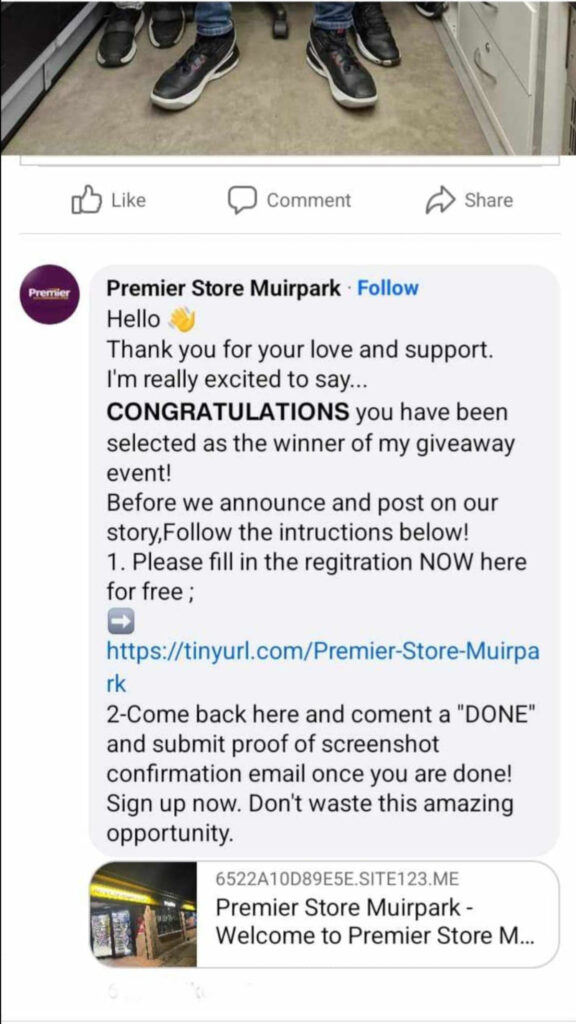SCOTS shop owners have been left devastated after “horrible” online scammers “ruined the fun” of their frequent giveaways after allegedly trying to nick card information from customers.
Zulfiqar and Anila Ali run Ali’s Convenience Store in Tranent, East Lothian, and often run prize giveaways online, where customers can enter competitions to win items such as air fryers and iPads.

However, after a recent giveaway of a bottle of Au Vodka, the pair were informed by customers that Facebook pages pretending to be the store had been messaging people to inform them they had won.
Whilst Zulfiqar, 50, and Anila, 44, managed to have the page taken down, they are now hesitant over any further giveaways after punters were sent links by the scammers leading to pages where credit card information could be stolen.
The shop owners shared a screenshot of one of the alleged scammer’s messages to a customer in an online post earlier this month.
They wrote: “It is so important you read our caption for giveaways. We will never ask you for bank details or to click a link.
“Scam pages post comments like the one shown here. If you see a comment like this, report it. scam pages have no followers or any content on.
“If in doubt message this page. Not any others. We cannot keep on top of every account.
“Please read the giveaway caption and don’t get caught out by these horrible people trying to ruin the fun.”
Speaking to Anila today she said: “My husband and I have been running this shop since January 2006.
“At the beginning of this year, we invested in a full refit of the shop and moved back in at the end of February.
“Since then, we have consistently been running like and shares and prize giveaways from air fryers to iPads and anything in between.
“At the same time, I am trying to build our online presence on Facebook with support from a digital media company now looking after our page.
“About two weeks ago, we ran a new like and share giveaway – two bottles of the new Cosmic Berries Au Vodka.
“We would draw the winner out after a week. A disclaimer was put at the time of announcing a new giveaway about not clicking any links and that we would never ask for any bank details, etc.
“Soon after, we started receiving messages and getting phone calls from customers saying they had received messages on their Facebook accounts, confirming they were the winner of the prize giveaway and to clink on a link.
“We did try and reassure customers that this was not us and to not click on any links.
“Davie Martin, a customer of ours and also a local radio presenter, also got in touch, and he then posted something on his page in support of us, and this was highlighted further.
“This was supposed to be a little fun, but it turned out to be a little upsetting as we were constantly having to reassure people that it wasn’t us sending these scam messages.
“We were assured by our media support that this had now been reported to Meta and that they had to report and get 118 scam pages closed down that same week for all other retailers they look after.
“If this was to continue at each giveaway, we may need to consider putting a stop as we cannot have our shop associated with any scam and to think if anyone was to click on these scam links and their bank accounts were wiped out or something.

“We would be blamed.”
Facebook’s owner, Meta Platforms, advises that social media users be wary of clicking deceiving links.
They state on their website: “Scammers target people to trick them into giving away money or sensitive information.
“Think of emails that offer a quick-and-easy investment scheme or an urgent text message from someone claiming to be a friend in need, or a phishing email claiming to come from Meta to alert you of issues with your account and asking you to immediately click on a link to learn more.
“They may create fake accounts pretending to be someone they are not or compromising existing social media accounts to try to deceive or defraud you or your friends out of money, personal information or access to your account(s).
“Note: If you get a suspicious email or message claiming to be from Facebook, don’t click any links or attachments.”

